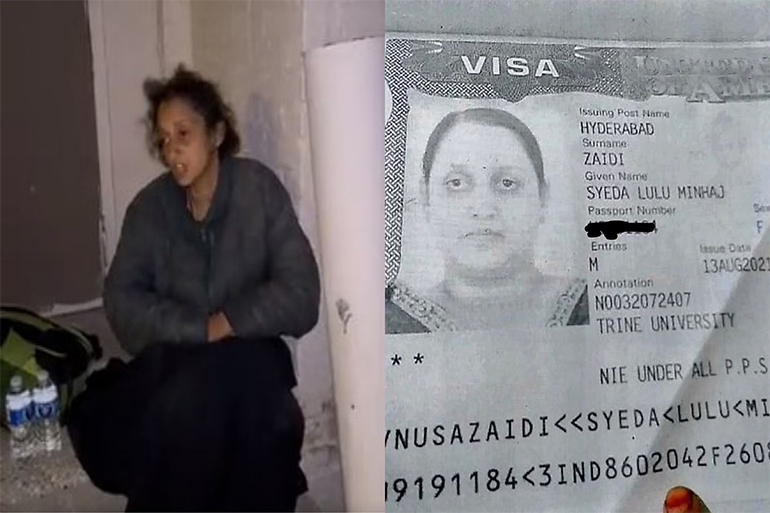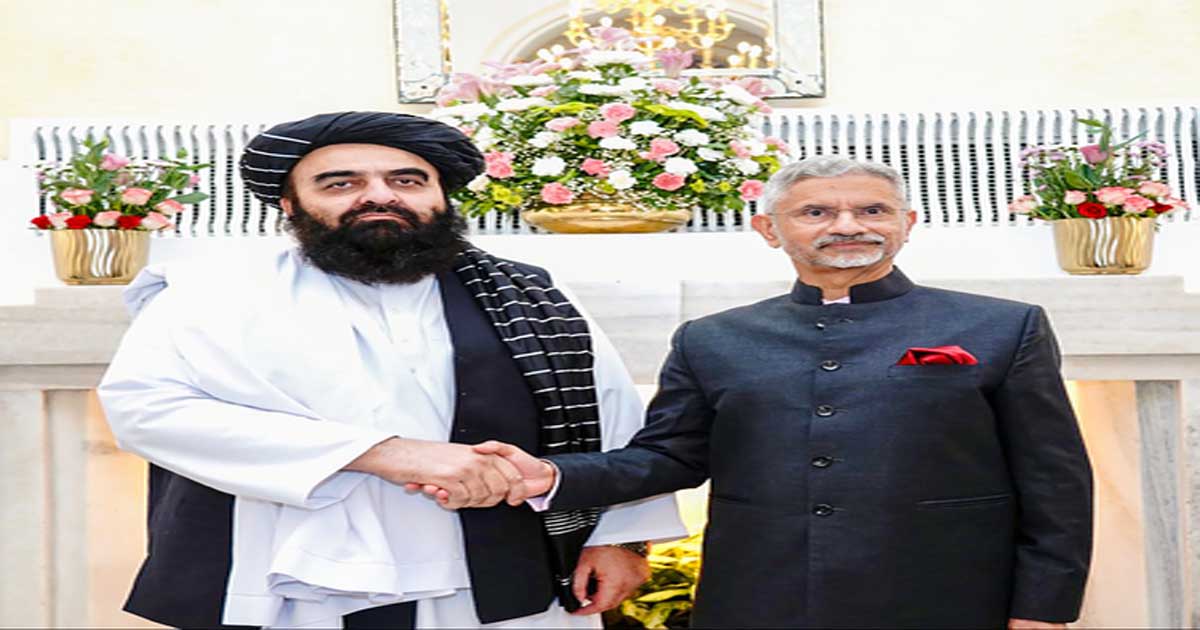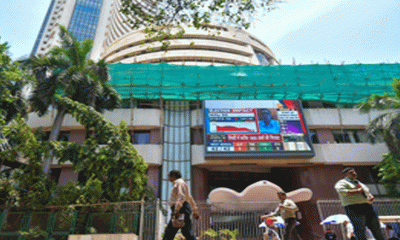International News
‘Can’t Recognise My Own Daughter,’ Says Mother Of Telangana Student Found In ‘Terrible’ Condition In US

When Syeda Wahaj Fatima bid goodbye to her daughter Syeda Lulu Minhaj back in August 2021, when she left for her Masters in the United States from Telangana, it meant things were looking up for a family that was reeling under the repercussions of the Covid-19 pandemic.
But a recent video of the 37-year-old Minhaj living in dire conditions on the roads of Chicago, a city in the US, has now led to Fatima running from pillar to post in hope of a way that can let her reach the country to take care of her daughter.
“I was not able to recognise my own daughter in the video. She has changed a lot, this is not how she used to interact or act with others,” an emotional Fatima told news agency. Fatima also wrote a letter to Minister of External Affairs, S Jaishankar, on July 22 and urged for his intervention to bring back Minhaj to India.
According to Fatima, Minhaj was a former lecturer at Shadan College in Hyderabad but was impacted with the closure of classes during the pandemic in 2020. Seeing an opportunity to do a Masters in the US, Minhaj, an Mtech graduate, left for the country to pursue post graduation in Information Science at Trine University in Detroit.
“Everything was going well with her. But two months ago somebody stole her mobile phone while she was on her way to another University in Ohio. When she ran behind the person, she forgot her bag on the road which was later taken by somebody else,” said Fatima, who got a call from Minhaj back in May after the incident from a stranger’s phone. “The stranger said on the call that his bus was coming and had to leave. I haven’t spoken to my daughter since that day,” stated Fatima, who added in the letter that she got to know from two Hyderabadi youths in the US that Minhaj was under depression and going through starvation when they first found her outside a Masjid in Chicago.
The viral video showed an incoherent Minhaj thanking a man for offering her food, while adding that she was bleeding and taken to paramedics before though it is not clear what actually transpired. “I would like some palak and dahi (curd),” Minhaj requested to the man helping her in the video.
People come together to support Minhaj
Politicians and activists have already come to the rescue of the Telangana native, with Khaleequr Rahman, a leader of Bharat Rashtra Samithi, formerly known as Telangana Rashtra Samithi, stating that he was able to get Minhaj in touch with a social activist in Chicago.
“I was able to get in touch with Mr.Mukarram, who is a social worker in Chicago. He and his family met her and she is right now admitted into a hospital. He told me that she is in major depression & mentally unstable condition due to the financial situation she got into as she couldn’t get the job. The first & the foremost thing is to get her out of the depression, then only she will be able to travel to India,” said the video tweet by Rahman, which showed Minhaj being taken care of by an Indian-origin family. Rahman added that he is helping Fatima to get a visa to the US by getting more details so that she can take care of Minhaj.
No passport with Minhaj’s mother, seeks help in reaching US
But despite best efforts, an immediate visa for Fatima seems unlikely as she is also taking care of her ailing husband.
“I have been going to some visa offices trying to get help but it doesn’t seem possible that I will get a visa soon. Minhaj’s father is also a heart patient and her sister is now married. So I am taking care of everything at home,” stated Fatima, who doesn’t own a passport.
As per a report by ANI, Amjed Ullah Khan, a spokesperson of the Majlis Bachao Tehreek (MBT), a party based in Telangana, has also appealed to IT Minister KTR (Telangana) to help in getting them passports and also a visa from the US Consulate in Hyderabad.
“I just want to talk to my daughter and see her once. I hope parents and students are well aware of everything before going abroad, with parents also taking a visa beforehand just in case anything wrong happens to their children there,” asserted Fatima.
International News
Pakistan fears losing more than diplomatic ground with Kabul turning to India

New Delhi, Oct 10: Pakistan could never imagine that a group it once raised and used to spread terror in neighbouring countries would one day run a government and realise that diplomacy does not flow out of the barrel of a gun.
When on the receiving end, Pakistan’s Defence Minister Khawaja Asif stated that Islamabad has “run out” of patience over the use of Afghan soil by “terrorists targeting Pakistan”.
He has also made a bizarre statement, claiming that Afghans have always stood beside India “yesterday, today, and tomorrow”.
If indeed his country had offered support to Afghan refugees, it was to raise a militia, not out of compassion. And all these rhetorics come when Afghanistan’s Foreign Minister Amir Khan Muttaqi is visiting India.
Pakistan has itself soured its relationship with the Taliban, attacking Afghanistan’s border areas, even resorting to aerial bombing, and driving back thousands of refugees from its land to an uncertain future.
Kabul has always refused to recognise the Durand Line – then hurriedly drawn by British occupiers – as a legitimate border.
The porous areas have witnessed intermittent skirmishes, affecting trade and transit. After the withdrawal of US-led troops, Islamabad expected the Taliban to remain eternally grateful and jump to its bidding, but the regime’s assertiveness has disrupted that. Kabul’s diplomatic overtures towards New Delhi have unsettled Pakistan.
While India does not officially recognise the Taliban regime, its pragmatic engagement signals a shift in Kabul’s foreign policy orientation. For Pakistan, this represents a strategic loss and a potential threat.
India’s growing ties with Kabul, combined with its strategic partnership with Iran, amplify these fears.
Possible increase in India’s diplomatic and trade relation with nations in Pakistan’s immediate neighbourhood blow winds of caution for Islamabad.
Meanwhile, Pakistan’s economic ties with Afghanistan have also suffered, with border closures, refugee deportations, and diplomatic tensions having disrupted transit routes.
India’s investment in alternative corridors like the International North–South Transport Corridor (INSTC) and Chabahar bypasses Pakistan entirely.
But following the re-imposition of sanctions against Iran and the Chabahar Port in particular, foreign companies became reluctant to participate in the port’s expansion.
India took over operations in 2018, and used it for trade with Iran and other countries, and also send relief materials to Kabul. Islamabad is eyeing Muttaqi’s India visit warily, fearing diplomatic isolation, where, with India engaging Afghanistan, Iran, and other Central Asian nations, Pakistan risks being left out of regional dialogues.
Increased Indian presence could lead to constricting its operations in intelligence gathering, surveillance, and influence over the region. Thus, Afghanistan’s tilt towards India adds pressure on Pakistan’s western flank.
The Taliban’s refusal to act as Islamabad’s proxy and India’s growing goodwill among Afghans have reshaped the strategic landscape. Pakistan’s view of India’s advantage in Afghanistan is shaped by a sense of strategic reversal.
What was once a zone of influence has become a source of insecurity.
India’s soft-power diplomacy, infrastructure investments, and pragmatic engagement with the Taliban have allowed it to gain ground practically without boots on the ground.
Islamabad now faces two main challenges – managing deteriorating ties with the Taliban and countering India’s expanding influence. But given utterances like those by Khawaja Asif, both seem distant for Pakistan.
As regional dynamics evolve, Afghanistan will remain a critical point in South Asia’s geopolitical chessboard – one where Pakistan’s traditional playbook may no longer suffice.
International News
Pakistan’s blitzkrieg of airstrikes on Kabul escalates tensions with Afghanistan

Kabul, Oct 10: Tensions between Pakistan and Afghanistan surged dramatically following multiple explosions in Kabul that residents and observers fear were the result of unprovoked cross-border airstrikes.
The Afghan capital was shaken as powerful blasts echoed through several neighbourhoods, with witnesses reporting the distinct sounds of aircraft overhead.
The explosions, reportedly originating from District 8 in eastern Kabul, a zone home to key government facilities and residential areas, triggered widespread panic. While the exact source and intent behind the blasts are still unconfirmed, early reports point to the possibility of airstrikes, raising concerns over the escalation of regional conflict.
The incident occurred just hours after Pakistan’s Defence Minister Khawaja Asif delivered a fiery statement in the National Assembly, suggesting a breakdown in diplomatic restraint.
“Enough is enough, our patience has run out. Terrorism from Afghan soil is intolerable,” Asif said, recalling a past visit to Kabul by Pakistani officials, during which Afghan authorities allegedly refused to offer assurances against militant activity targeting Pakistan.
Although Pakistan has not officially confirmed launching any strikes, the timing of Asif’s comments and the subsequent explosions in Kabul have led to heightened suspicions of deliberate military action.
In the wake of rising tensions, mobile internet services were abruptly suspended in the Pakistani cities of Islamabad and Rawalpindi, though authorities have not offered an explanation for the disruption.
The alleged strikes were swiftly condemned by Baloch representative Mir Yar Baloch, who took to X, issuing a strong rebuke of Pakistan’s actions.
“We strongly condemn the terror attack on Kabul today by the rogue state of Pakistan. The terrorism carried out by the rogue state of Pakistan and its diseased/rogue military, which is involved in the attack on Kabul, could be ended within weeks if Afghanistan recognises Balochistan as a free (independent) state.”
He went further to argue that Pakistan’s military garrisons and airbases, which are located in Balochistan and occupied Pashtunistan, do not represent the nation as a whole but rather function as instruments of coercion against neighbouring regions.
“Pakistan has no direct border with Afghanistan; the military garrisons and airbases of what is, in effect, Punjab-based Pakistan are located in Balochistan and occupied Pashtunistan, and they are a symbol of terrorism for Balochistan and Pashtunistan as well as a threat to Afghanistan’s security,” he added.
Mir Yar Baloch proposed a bold geopolitical shift as a solution: “If today Kabul recognises Balochistan as an independent state and incorporates Pashtunistan into Afghanistan, accepting it as part of its territory, then the Baloch and Afghan peoples together could secure their border and airspace and would not allow Pakistan’s military aircraft and drone strikes to enter their air space and target innocent civilians, and Pakistan would not be able to challenge our national security.”
As tensions simmer, fears are growing over the possibility of further military escalation.
Business
PM Modi meets Keir Starmer in Mumbai for strengthening India-UK ties

Mumbai, Oct 9: Prime Minister Narendra Modi welcomed UK Prime Minister Keri Starmer at Raj Bhavan and held a meeting as part of the process to strengthen the strategic partnership between the two countries.
The Ministry of External Affairs shared photos of Prime Minister Narendra Modi meeting UK Prime Minister Keir Starmer.
“Together for stronger India-UK ties…,” posted Randhir Jaiswal, the MEA spokesperson, on X.
Earlier, Commerce and Industry Minister Piyush Goyal said his meeting with UK Prime Minister Keir Starmer here further deepened trade and economic partnership for mutual prosperity between the two nations.
Starmer arrived in India for a two-day visit on Wednesday, accompanied by the biggest-ever trade delegation from the country to India.
“Delighted to call on UK Prime Minister Keir Starmer. Discussed avenues to further deepen India-UK trade and economic partnership for mutual prosperity,” Goyal posted on X social media platform.
Goyal earlier met Peter Kyle, the UK’s Secretary of State for Business and Trade, with a view to moving forward with the operationalisation of the India-UK Comprehensive Economic and Trade Agreement (CETA) and doubling the bilateral trade by 2030.
“The meeting marked a significant step towards operationalising the India-UK CETA, with both Ministers agreeing to reposition the Joint Economic and Trade Committee (JETCO) to oversee its implementation and delivery,” according to the Commerce Ministry statement.
Both sides underlined their commitment to ensuring swift, coordinated, and results-oriented implementation of the Agreement, aimed at realising its full potential for businesses and consumers in both countries. The ministers reaffirmed their shared ambition to double bilateral trade by 2030, leveraging the complementarities between the two economies in areas such as advanced manufacturing, digital trade, clean energy, and services.
Emphasising the transformative scope of CETA, they discussed ways to maximise its benefits through regulatory cooperation, addressing non-tariff barriers, and promoting supply chain integration. The highly productive Commerce Secretary and Director General-level meeting set the tone for the Ministerial meeting, which laid a strong foundation for a full day of engaging and forward-looking discussions.
-

 Crime3 years ago
Crime3 years agoClass 10 student jumps to death in Jaipur
-

 Maharashtra1 year ago
Maharashtra1 year agoMumbai Local Train Update: Central Railway’s New Timetable Comes Into Effect; Check Full List Of Revised Timings & Stations
-

 Maharashtra12 months ago
Maharashtra12 months agoMumbai To Go Toll-Free Tonight! Maharashtra Govt Announces Complete Toll Waiver For Light Motor Vehicles At All 5 Entry Points Of City
-

 Maharashtra1 year ago
Maharashtra1 year agoFalse photo of Imtiaz Jaleel’s rally, exposing the fooling conspiracy
-

 National News1 year ago
National News1 year agoMinistry of Railways rolls out Special Drive 4.0 with focus on digitisation, cleanliness, inclusiveness and grievance redressal
-

 Maharashtra11 months ago
Maharashtra11 months agoMaharashtra Elections 2024: Mumbai Metro & BEST Services Extended Till Midnight On Voting Day
-

 National News1 year ago
National News1 year agoJ&K: 4 Jawans Killed, 28 Injured After Bus Carrying BSF Personnel For Poll Duty Falls Into Gorge In Budgam; Terrifying Visuals Surface
-

 Crime12 months ago
Crime12 months agoBaba Siddique Murder: Mumbai Police Unable To Get Lawrence Bishnoi Custody Due To Home Ministry Order, Says Report






















